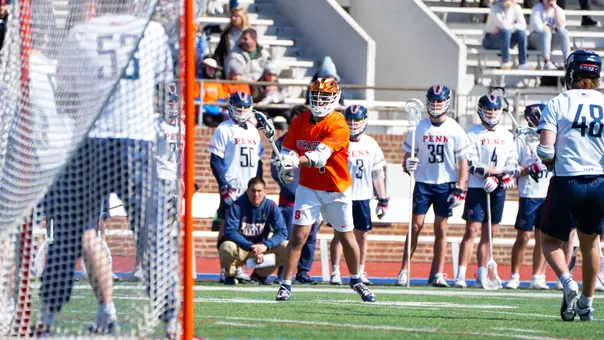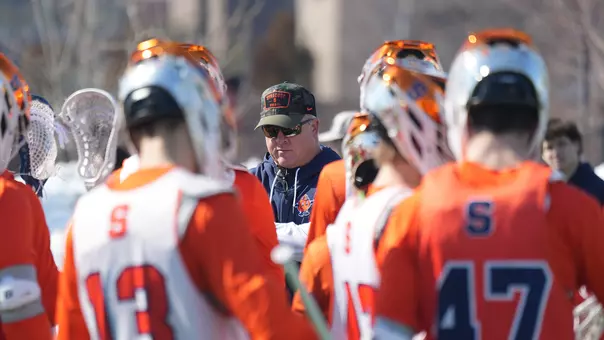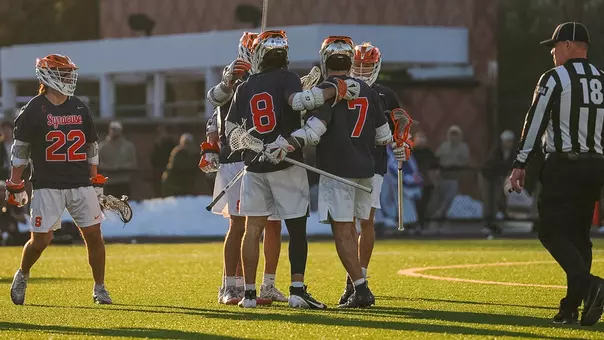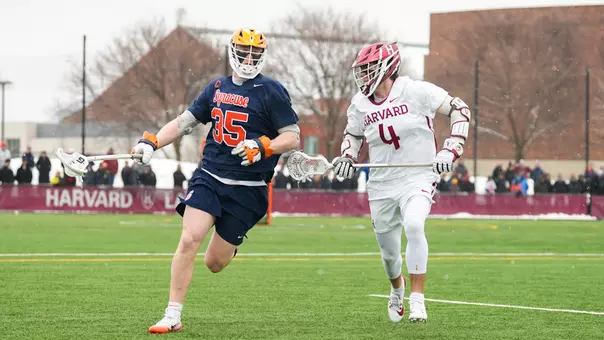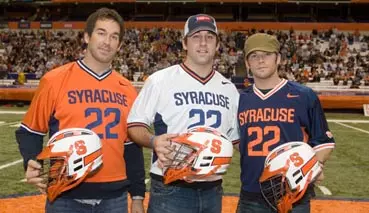
Casey, Ryan and Mike Powell returned to the Dome in 2006.
All in the Family: The Powells
10/27/2006 9:01:00 AM | Men's Lacrosse
by Jacob Bartholomew
West Carthage, New York: A small village, upstate, about 90 miles from Syracuse University. Home to three of the most legendary lacrosse players the sport has ever known. The three Powell brothers, Casey, the oldest, Ryan, the middle and Michael, the youngest, grew up as any brothers would, participating in little league, fighting with each other, and playing catch in the backyard. When they discovered lacrosse, they immediately took a liking to the game, and the legend began.
Casey and Ryan honed their skills in the backyard, pushing each other to improve, despite being the only kids in town with lacrosse sticks. Little brother, Michael, was there too, scaling the neighbor’s fence, and fending off their German shepherd to bring back any balls that sailed off target. Both Casey and Ryan idolized another pair of legendary Syracuse lacrosse brothers, the Gait twins. The Powells made the trip with their parents to watch Paul and Gary play and then came home and mimicked the Gait brothers’ moves. Ten-year old Casey wore his Gary Gait #22 jersey and eight-year old Ryan wore Paul’s #19.
By the time Casey and Ryan reached high school, the varsity lacrosse team and the record books at Carthage High School were waiting for them. Casey, two years older than Ryan, enjoyed success first. He had a stellar high school career, capping his three years on the varsity team with an All-American senior year in which he scored 79 goals and 74 assists. He left as the most prolific high school lacrosse scorer ever in the state of New York. Recruited by almost every program in the country, he chose Syracuse, saying at the time he’d always wanted to play for the Orange.
“Once everybody else started recruiting me my interest in SU faded,” Casey said in a 1993 Post-Standard article. “Then I realized it was something I’ve always wanted to do. I think I’ll fit in well. They play my style – run and gun.”
The feeling was mutual. SU’s head lacrosse coach, Roy Simmons Jr, a legend in his own right, was taken with Casey ever since he first saw him play as a high school sophomore.
“He did a lot of things with either hand that you wouldn’t have seen before unless you had seen Paul and Gary Gait,” Simmons said in a 1998 Sports Illustrated article.
Upon arrival at SU Casey was given the fabled #22 jersey worn by his idol, Gary Gait, and another former SU standout, Charlie Lockwood, an All-American who played from 1991-1994.
Casey took the lacrosse world by storm his rookie year, scoring 39 goals on his way to amassing 67 points and the first of four consecutive All-America accolades. However, his finest moment that year came when he helped Syracuse to its sixth lacrosse national championship.
The following year, Casey switched from attack to midfield, a new position for him. He adjusted well and his hard work on the practice field paid off as he was selected as USILA’s Midfielder of the Year and was named a first-team All-American. The Orange finished the season 9-3 and found itself in unfamiliar territory when it had to play a first-round NCAA match for the first time in five years. With a pair of wins against Army and North Carolina, SU made it to the Final Four for the 14th straight time. Powell’s four goals and an assist weren’t enough against Princeton in the semifinals and the Tigers went on to win the national championship. Although upset about the loss, Casey found a reason to look forward to next season. A familiar face would join him in the midfield for the 1997 campaign - his brother Ryan.
As the backup quarterback and point guard to Casey on Carthage Central High’s football and basketball teams, Ryan wasn’t sure if he wanted to join him at Syracuse or forge his own path somewhere else, away from the shadow of his older brother. He decided on Syracuse, however, and as he prepared for his freshman season with the Orange, he was ready for the inevitable comparison.
“The newspaper articles wouldn’t even say my name first,” Ryan said in a 1998 Sports Illustrated article. “They’d say, ‘Casey’s brother, Ryan, scored two goals.’ But my ultimate goal is to win a national championship, and that’s why I came here. I knew I’d be in his shadow, but I think I’ve learned to accept it very well. My junior and senior year I’ll be ready to take over.”
He didn’t know it then, but it seemed ironic that Ryan Powell put down “receive All-America status” under the career aspirations section of his student-athlete questionnaire. By the time his Syracuse lacrosse career was over, people no longer referred to him as “Casey’s brother.”
Having Ryan on the same field again, Casey had a breakout year in 1997. He was named to the All-America team for the third straight year and found the back of the net 43 times and dished out 40 assists. The top scorer in the nation, Casey was presented with the Lt. Raymond Enners Award, given to the best Division I lacrosse player.
The younger Powell had a very successful year as well. Ryan started every game in the midfield and scored 16 goals and handed out 17 assists, good enough for fourth on the team in scoring with 33 points.
When the Orange faced Loyola in the quarterfinals of the NCAA tournament, Casey showed his versatility on the field. Coming into the game, Loyola coach Dave Cottle knew that his team would have to find a way to keep Casey Powell out of the goal area if it was to have a chance. It did, and despite failing to score a goal for only the fourth time in his collegiate career, Casey led SU to a 13-12 win on the strength of his NCAA Tournament record-tying eight assists.
Despite another strong game from Casey (four goals) and Ryan (three goals), Maryland defeated the Orange in the semifinals, 18-17. With another season behind them, the Powell brothers immediately focused on next year and when Roy Simmons Jr. heard an unusual request from the pair regarding his front line over the summer, he took a closer look at the situation. Casey and Ryan came to his office one morning and asked if they might play together at the attack position. After he considered the proposition, Simmons thought it made sense to put that the two brothers from Carthage together to spearhead the offense, as well as provide veteran leadership.
“It’s been a dream of theirs to play at the same position,” Simmons said in a 1998 Daily Orange article. “And they asked this year if they could spend some time together as brothers, and we’re certainly going to honor that commitment.”
When the 1998 season started, Ryan and Casey found themselves playing at the same position, lining up together on attack for the first time since high school. Despite the spotlight firmly shining on him, Casey realized the potential that the brothers had playing together.
“It’s going to take a lot of pressure off me,” he said at the time. “He’s a carrier too, and he’s going to go to the cage and create his own double team, so the defense is going to have to worry about him as well.”
It couldn’t have worked out any better as Casey and Ryan led the Orange to victories in its first five games and seven wins of their first nine. The team repeated its mark from the previous year to finish the regular season 10-2. Casey tied an Orange record by scoring nine goals in a game against Towson and was again named to the All-America team. Any senior celebration that Casey envisioned was cut short by Princeton again when it defeated the Orange in the semifinals, 11-10, holding the SU offense scoreless the last 5:14 of the game.
It was a bittersweet ending for Casey. While winning the national championship as a freshman in 1995, he was never made it back to the title game. However, he finished his four-year Syracuse career with the most points in school history, 287, and in the conversation as one of the greatest to ever put on a lacrosse jersey.
The following year was Ryan’s time to shine. Starting the season ranked third in the voting for the 1999 College Lacrosse USA Pre-season Player of the Year, he asserted himself as a bona-fide star, contributing 39 goals and dishing out 46 assists for a total of 85 points.
As Ryan entered his senior year thoughts of a national championship floated in his head. He gave thought to another record too, the total points record held by his brother Casey. His 85 points in 1999 were two more than Casey ever scored in any season during his stellar career.
“I know I can get 96 points this year because others have done it before, so anything is possible,” Ryan said prior to the season. “It isn’t a goal so much as it is a possibility if I do my job.”
Needing to average more than six points a game to catch Casey, Ryan was on track through the Orange’s first eight games. Two late-season contests against Rutgers and Massachusetts only yielded seven points, and entering the NCAA Tournament, the record was still up for grabs with Ryan needing 18 points to catch his older brother.
Ryan scored eight points against Georgetown in the quarterfinals and added five more against John Hopkins in the semis. Ryan needed just five more to cap a magical career and finally cast aside the shadow of his older brother. As the championship game against Princeton drew closer, Ryan knew where his priorities were and stayed focused on the ultimate goal, winning a national championship.
“Winning Monday is all I care about,” Ryan said before the title tilt. “If I don’t score a point on Monday and we win, that’s just fine by me. We came to College Park (Md.) to win a national championship and nothing else. You have to set your goals high, I want a ring before I graduate and nothing else.”
By the time Monday’s game ended and the dust settled it could not have been a more story-book ending for Ryan Powell and the Syracuse Orange. SU captured its first title in five years, knocking off its bitter rival Princeton, 13-7, enabling Ryan to go out a champion and a record holder.
After scoring the game’s opening goal, Ryan was shut down by the Tiger defense until he scored and added an assist late in the second quarter to give Syracuse a commanding 7-1 lead. Needing one more point to tie Casey’s record, Ryan began to think about his brother’s mark.
“I’ll admit, at 7-1 I began to think I could do it,” he said following the game. “It didn’t mean that I was going to change my game, but I knew that if I had the chance I would go for it. I knew that if it was going to happen, I needed the ball.”
That chance came with 90 seconds left in the game. Ryan got the ball and fed a pass to teammate Ethan Mills who scored four seconds later to give Ryan assist number 51 and a share of the record. A joyful scene ensued as Ryan ran off the field with his hands in the air, his teammates celebrating by his side. As the buzzer sounded, Ryan found Casey in the middle of the field. The two brothers who pushed each other for so many years were equals once more. Casey hugged Ryan and told him how proud of him he was. When they finally separated from their bear-hug, tears flowed from the older brother’s eyes.
“It couldn’t have been scripted any better than this,” Casey said at the time. “I’m Ryan’s brother today.” Those words of praise weren’t lost on Ryan, who realized that with four All-America seasons, 287 points and a national championship, he made a name for himself.
“I think all along I wanted to tie the record,” Ryan said after the game. “If I could write a storybook ending, this would be it.”
Ryan had one more job to do before the end of the day. Spotting SU’s newest recruit, his brother Mike, in the stands, Ryan ripped off his #22 Syracuse jersey, and in much the same way Casey had done to him, passed the symbolic “torch” to his younger brother.
“I’m old news,” Ryan told Mike. “You’re the new #22.”
If Ryan thought it was hard living up to Casey and his legacy, try living up to both of your older brothers, who were four-time All-Americans and national champions and shared the SU all-time points mark. For Michael Powell, it was a daunting task, a task that he wanted to take on from the start.
“I’m kind of nervous about it,” he told the Post-Standard in 2000. “Those are pretty lofty goals set before me. I’m not going into Syracuse thinking to myself that I have to break this record. I just want to get a ring like these guys did and wear some jewelry home from College Park.”
Much like his brothers had done before him, Mike burst onto the college lacrosse scene in 2001. After his first 13 games in which he scored a team-leading 58 points, including 25 goals and 33 assists, SU coach John Desko knew he had a special player on his hands.
“I didn’t think he’d do quite as well as he’s doing,” Desko said at the time in a Syracuse Herald American article. “He hasn’t really made many mistakes, like freshmen usually do, for the amount of time he’s played. He’s played with a lot of poise and confidence.”
Mike’s first season with the Orange ended with a loss in the NCAA title game to Princeton. Despite the 10-9 overtime loss, there was cause for celebration. The youngest Powell was named to the NCAA All-Tournament Team and his 70 points were the second-most ever by a first-year player at SU. He was also the first freshman in school history to be named a first-team All-American. If that wasn’t enough, he received the Jack Turnbull Award, given to the nation’s top attackman, an award his older brothers both received during their senior years of 1998 and 2000, respectively.
If his freshman season labeled Mike SU’s “marked man” in the eyes of opposing defenses, then his sophomore 2002 campaign cemented him as the nation’s best player, beginning with the designation of pre-season national player of the year. Amassing goals and assists at a record clip, he powered the Orange to a 13-2 regular season mark as the nation’s leading scorer, highlighted by a career-high five goals against Army.
“You never know what he’s going to do,” said Orange defender John Glatzel in 2002. “He can be behind the goal and just jogging and all of a sudden, just take off. He’ll get a couple steps on you and do some amazing behind the back pass or something a normal player would never think about doing.”
“He comes out and works hard, probably harder than anybody else on the team,” SU captain Billy St. George said. “He tries to give everybody direction and tries to help everyone improve.”
Easily qualifying for the NCAA Tournament, the Orange’s quest for the national championship began with a 10-9 victory versus Duke in the quarterfinals. Mike led all players with four assists, contributing both as a scorer and a playmaker. In the semifinal game against Virginia, senior Tom Hardy made the difference when his goal gave Syracuse the lead with 32 seconds left in the second overtime period. The Orange held on for a 12-11 victory, with Mike adding two goals and an assist. Heading into the championship game, a familiar foe awaited. The Princeton Tigers were eager to repeat as national champions and jumped out to an early 3-0 lead in the first quarter. After that, it was all Orange. It took over during the second quarter, and never let up, holding on for the 13-12 triumph and the eighth national championship in school history. Raising his stick high in the air in celebration as the final horn sounded, Mike was right in the thick of things as he scored a game-high seven points on four goals, including the game-clincher. He also had three assists and was named the tournament’s Most Outstanding Player.
“It was pretty crazy after the game,” he told the Post-Standard. “Little kids are always all over me because of Ryan and Casey. And I think that after that game, I kind of realized that maybe I might be as good as they were.”
That summer the awards and accolades poured in. First-team All-American. NCAA All-Tournament Team. National Attackman of the Year. Tewaarton Trophy Winner. Mike took it all in and then it was off to Australia, where he participated in the 2002 ILF World Championship as a member of the U.S. National Team. He returned as Team USA’s second-leading scorer and with 154 career points after only two seasons at SU, there was serious talk about the youngest Powell eclipsing his two older brothers’ points mark.
Willing to do whatever it took to return to the Final Four, he spent more time at midfield than he had, a position vacated by graduation and injury.
“People have had two years to watch him and see his characteristics and they’ve come up with defenses to stop him, so I think he’s seen so many kinds of defenses and players over the years, that he knows his options,” said Desko during the season. “By us moving him, it’s just another look. It’s something different that other teams have to prepare for.”
Sacrificing his position for the team, Mike’s numbers dropped. He finished his junior year with 20 fewer points than the previous year, and scored nine less goals. The team struggled a bit during the regular season, going 9-5 but kept alive its consecutive Final Fours streak before losing to Johns Hopkins in the national semifinals.
After being selected Attackman of the Year again and perhaps realizing that he cradled his legacy in his hands as much as he cradled a ball running towards the goal, he put together a year that few could have imagined. One of the defining moments came in the last home game of his career, a May 1 2004 contest against Massachusetts. Mike performed an acrobatic move never seen before in the lacrosse world. Carrying the ball downfield in the fourth quarter, he did a forward flip in mid stride, hit the turf and unleashed a shot that just missed the back of the net. The Dome crowd went wild.
“I used to do a lot of that stuff in high school,” Mike said in a 2004 Baltimore Sun article. “I really liked the rush it gave me before the move. Massachusetts took it as an insult, and a lot of lacrosse fans looked at it like I was showboating, but I don’t see it that way … in order for the sport to grow, I think someone needs to come along and do some things that no one has ever seen before.”
Finishing the regular season 11-2, the Orange advanced to the Final Four for a record 22nd consecutive time with wins against Albany and Georgetown. Senior Kevin Dougherty scored a career-high five goals as the Orange defeated Johns Hopkins in the semifinals.
In the title game against Navy, Mike realized that he needed to get his teammates involved. He tallied five assists, but with just over a minute to play and the score tied, Mike found himself with the ball. He raced up the sideline toward Navy’s goal and took a shot and scored the game-winner and the final goal of his remarkable Syracuse career. It was a story-book moment that netted the Orange a 14-13 victory, Mike his second national championship and SU’s ninth title overall. Celebrating on the soggy field at M&T Bank Stadium, Mike summed up what his last goal meant.
“I had a lot of things going through my mind,” he said. “Ever since I was a kid, I’d dreamed of getting the goal that won the championship. And I had that dream again last night before the game. And after all this time, it finally came true. Scoring the last goal of the season. Scoring the last goal of my career. There’s nothing better than that.”
After the tournament, Mike was named the 2004 National Player of the Year and The Tewaarton Trophy Winner for the second time. He was named The National Attackman of the Year again, the first player to win it four times. He was picked to the All-America team, the only player in SU lacrosse history, and the fourth in Division I history to be named a first-team All-American four times.
Perhaps the most fitting award though, resulted from his 89 total points as a senior. Mike finished his career with SU’s all-time scoring mark (307), breaking the record held by Casey and Ryan. It only seemed right that a Powell would amass the most points in SU history.
All three went on to play in the MLL, with Casey and Ryan enjoying time together playing for the Rochester Rattlers for two years, and Mike leading the Baltimore Bayhawks to the league championship in 2005 along with the man he used to idolize growing up, Gary Gait. The brothers enjoyed a memorable summer when they were able to play together on the same line for the first time when they represented Team USA under familiar face John Desko at the ILF World Championship in July, 2006. Although Team USA lost in the final to Canada, the experience was one the three brothers would never forget.
The three brothers each wore the fabled #22 jersey and wowed fans in ways that would never be forgotten. Each made their marks on the SU record books. More importantly, by the time each of them finished their Orange careers they were all national champions and added to SU’s rich lacrosse history in their own unique ways. Casey, the proud older brother. Ryan, the middle brother who sought his own place. Mike, the youngest, whose creativity and scoring ability knew no bounds.
Postgame | #7 Syracuse at #19 Penn
Monday, March 02
Postgame Press Conference | Syracuse vs. Boston College
Monday, March 02
Highlights | Syracuse vs Boston College
Sunday, March 01
HIGHLIGHTS | #7 Men's Lacrosse at #19 Penn
Sunday, March 01










